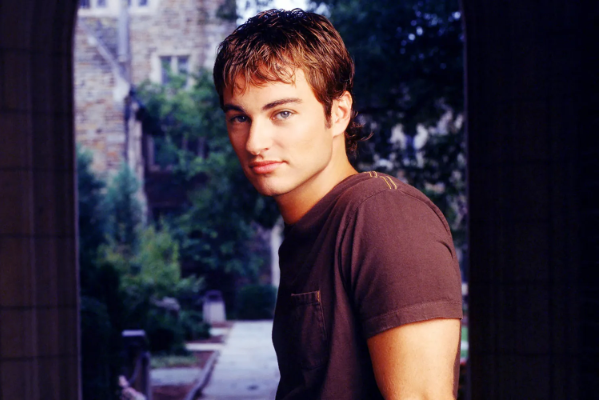Movies
Kerr Smith Reflects on Dawson’s Creek and Its Groundbreaking Gay Storyline
1. The Birth of Jack McPhee — A Character Who Changed Television
When Dawson’s Creek first aired in the late 1990s, it quickly became a cultural touchstone for an entire generation. Known for its emotionally raw storytelling and articulate teenage characters, the show tackled subjects most network dramas avoided. But one of its most pivotal decisions came in Season 2, when the character Jack McPhee, played by Kerr Smith, was introduced.
Initially, Jack appeared as the quiet, introspective new kid at Capeside High. His character arc seemed straightforward—a romantic interest for Joey Potter and a supporting member of the group. But midway through the season, the show’s creator, Kevin Williamson, informed Smith that Jack’s storyline would take an unexpected and historic turn: Jack would come out as gay.
At the time, such a move was unprecedented on network television, especially within a show centered on teenagers. Smith later revealed that he was completely surprised by the decision. He hadn’t auditioned for the role knowing that Jack would be gay, and when Williamson approached him with the new direction, Smith asked for time to think. He spoke to family, friends, and trusted mentors before agreeing.
It wasn’t hesitation rooted in prejudice—it was fear of how the world would react. The late 1990s were not an easy time for open portrayals of LGBTQ+ characters, especially on mainstream teen shows. Smith knew that once this episode aired, his life and career could change dramatically.
But after reflection, he decided to take the leap. He recognized that what Dawson’s Creek was doing wasn’t just about drama—it was about representation. “Looking back,” he has said in interviews, “it was one of the best decisions I ever made.”
That decision would forever change how television portrayed gay characters, marking a turning point in pop culture.

2. Breaking Barriers — The Courage to Tell a New Kind of Story
Jack McPhee’s coming-out episode remains one of the most defining television moments of the 1990s. For the first time on network TV, a teenage character’s internal struggle with his sexuality was treated with dignity and authenticity. There were no punchlines, no caricatures, no easy resolutions—just a young man wrestling with his identity in a small town.
Kerr Smith recalled how the production team handled the storyline with sensitivity and seriousness. Every scene was written and filmed with an awareness of how groundbreaking it was. The writers knew they weren’t just crafting television—they were changing the conversation.
Still, the risk was real. When the episode aired, reactions were mixed. While many fans and critics praised Dawson’s Creek for its courage, there was also backlash. Smith remembered that during filming in Wilmington, North Carolina, some protests occurred outside the production area. He even described sitting quietly behind a wall during lunch, hearing the distant chants of people objecting to the storyline.
It was a stark reminder of the cultural divide that still existed. But that didn’t deter him. He had made a choice—to tell Jack’s truth as sincerely as possible. The show didn’t sensationalize Jack’s sexuality. Instead, it focused on the emotional and social impact of coming out: the confusion, the fear, the courage, and the slow journey toward self-acceptance.
Jack’s coming out wasn’t just a moment—it was an evolution. Across multiple seasons, Dawson’s Creek explored his relationships, family dynamics, and self-discovery. The writing gave audiences something rare at the time: a gay teen character with depth, vulnerability, and humanity.
In the middle of all this, Smith faced the challenge of balancing realism and respect. His portrayal struck that balance perfectly. His Jack McPhee wasn’t defined by being gay; he was defined by being human.
3. The Kiss That Made Television History
Perhaps the most talked-about moment in Kerr Smith’s tenure on Dawson’s Creek came in 2000, when Jack McPhee kissed Ethan Brody, played by Adam Kaufman. It wasn’t just a kiss—it was a cultural earthquake.
For network television, it was one of the first times two male characters shared a romantic, emotional kiss on-screen in a primetime show. It wasn’t comedic or played for shock value—it was intimate, genuine, and natural. For millions of viewers, especially young LGBTQ+ teens watching in secret, it was life-changing.
Smith has often said that, at the time, he didn’t fully grasp the magnitude of what they were doing. To him, it was a scene written with honesty and purpose. But in the years since, he’s heard countless stories from fans who were deeply moved by it—people who said that moment gave them courage or helped them come out to their families.
The kiss sparked national headlines. Some networks hesitated to promote it; others praised it as bold and necessary. But in the years that followed, it became clear that Dawson’s Creek had opened a door that could never again be closed.
That single scene helped normalize something that had long been hidden from view. It told audiences that love, in all its forms, belonged on screen.
Kerr Smith later described filming the scene as “emotional but freeing.” He and Kaufman approached it professionally but also knew they were stepping into uncharted territory. There was tension, yes—but also pride. The cast and crew understood the weight of what they were creating.
Two decades later, that moment is still remembered as a cornerstone in television history—a turning point that shifted both storytelling and audience expectations forever.
4. The Aftermath — Pride, Pressure, and Perspective
Playing Jack McPhee was not without challenges. In interviews, Kerr Smith has been candid about how nervous he was at the time. The entertainment industry was less open than it is today, and actors worried that taking on a gay role might limit future opportunities.
However, Smith refused to let fear dictate his choices. Over time, as public acceptance grew and television evolved, he realized just how important his role had been. Fans reached out to thank him, parents expressed gratitude, and critics began recognizing Dawson’s Creek for more than just teen angst—it became a show that helped push culture forward.
Smith has shared that, in hindsight, he’s proud of every moment. He acknowledges the courage it took from both the writers and the network to move forward with such a storyline. The show aired during a time when same-sex marriage was still years away from legalization, and mainstream media often avoided LGBTQ+ themes.
But Dawson’s Creek treated Jack’s story with empathy, and in doing so, changed how viewers perceived gay characters. Smith said he eventually came to see the role as an honor: a responsibility to portray authenticity, and a privilege to contribute to progress.
In the years since, Smith has built a diverse acting career across film and television, yet he remains closely associated with Jack McPhee. When fans approach him, it’s often not to talk about fame, but gratitude. Many tell him that watching Jack’s journey helped them navigate their own.
Now, as he prepares to release his memoir, I Don’t Want to Wait: My Journey on Dawson’s Creek Without a Paddle, Smith has promised to explore these experiences in greater depth. He plans to revisit what it meant to be part of a cultural revolution—one that redefined television’s relationship with truth, love, and identity.
5. Legacy and Evolution — How One Storyline Changed Everything
Looking back today, it’s hard to overstate how influential Dawson’s Creek was in shaping the television landscape. Before Jack McPhee, most LGBTQ+ characters were either side plots or stereotypes. After him, networks began to recognize the need for real, multidimensional representation.
Jack’s character paved the way for countless others—characters in shows like Glee, The Fosters, Love, Victor, and Heartstopper. Each of these stories owes a debt to the groundwork laid by shows like Dawson’s Creek and actors like Kerr Smith, who helped break the silence.
Smith himself acknowledges this evolution. He has said that the world is now “much more open, much more accepting,” and that progress gives him hope. But he also recognizes that representation remains a continuing responsibility—one that each generation of storytellers must uphold.
His portrayal of Jack McPhee was more than just acting; it was activism through art. It challenged social norms, sparked conversations, and humanized experiences that were often marginalized or ignored.
The fact that the storyline still resonates more than twenty years later speaks volumes about its emotional truth. Jack’s journey wasn’t just about coming out—it was about growing up, finding confidence, and learning self-worth in a world that often misunderstands difference.
For Kerr Smith, it’s a legacy of courage and compassion. For the industry, it’s a reminder that storytelling has the power to change hearts and minds.
And for the viewers who saw themselves reflected on screen for the first time, it was a moment of visibility that still matters.
From: Teetopiaworldus
